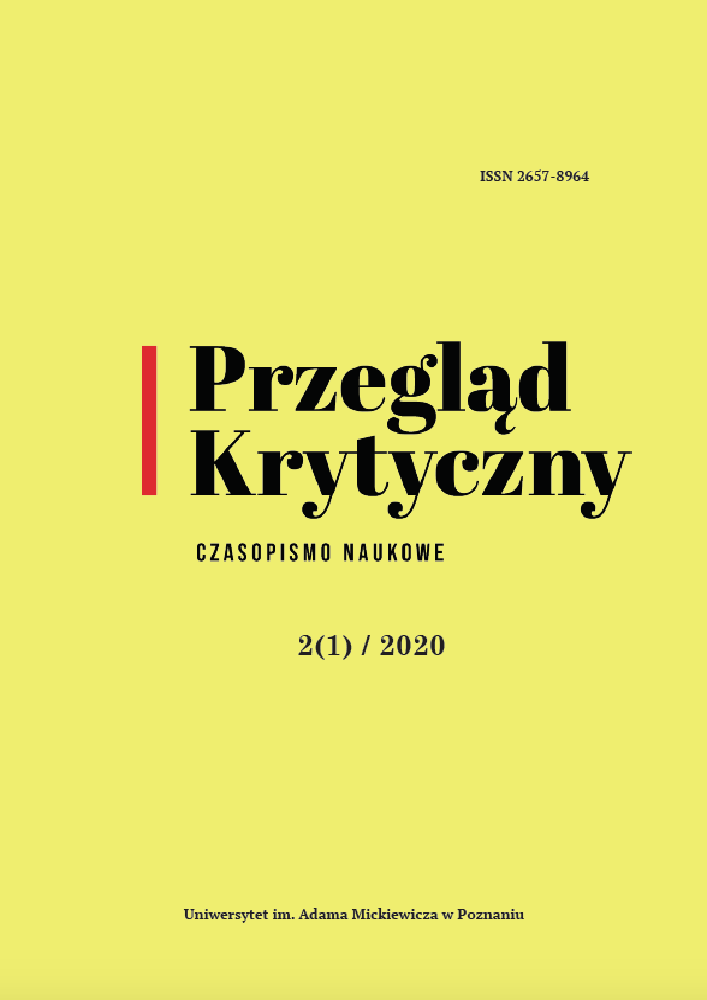Abstract
The analysis of the process of commodification of education with the specification of higher education was the subject of the bachelor’s thesis, which the purpose was to explain this phenomenon and its detailed description. The subject restricted the scope of main problem to higher education because of formal limitations of bachelor’s thesis and the volume of issues. The main research problem was to find the answer to the question to what extent and how the commodification of education affects the chances of educating to young people. Characteristics of the phenomenon took into account the problems concerning the consequences of the commodification process and its elements. The following chapters of bachelor’s thesis contained an explanation of the significance of the phenomenon, key concepts and the context of the appearance of commodification in the area of education. It was also important to pay attention to the reverse process which is decommodification. There were specify the forms which take decommodification of education and its advantages and disadvantages. The analysis also included the consequences of the commodification and decommodification process, which contained among others the lowering of the value of diplomas. To explain the purpose and research problems of bachelor’s thesis, a secondary data analysis was use and include literature, scientific papers and reports, including the Polish Central Statistical Office and Eurostat. The analysis contained reports and data on Poland as well as other European countries, which made it possible to compare important aspects of commodification in education between countries and outline the situation of universities in Europe. Based on the analysis of data, the most important consequences of the commodification process in the higher education that were signalize included: broadening the diversity among the population, the growing number of people with higher education, the emergence of alternative forms that enable the acquisition tertiary, converting academic knowledge into the knowledge taking the form of the commodity. The process of commodification of higher education is undoubtedly noticeable at universities, which has been documented in bachelor’s thesis by describing its individual components and consequences.
References
Adamska, Agata. 2017. “Efektywność e-nauczania z perspektywy szkoły wyższej”. Edukacja Ekonomistów i Menedżerów: Problemy, Innowacje, Projekty 2(44): 83-95.
AEGON. 2013/2014 Koszty studiowania w Polsce i za granicą. https://www.aegon.pl/siteassets/media/raporty/raport-kosztow-studiowania-w-polsce-i-za-granic_aegon.pdf. Dostęp 28.03.2019.
Baranowski, Mariusz. 2017. “Education in Times of Uncertainty. Uncertainty in Education. A Critical Approach.” Ss. 63-72 w Symbolic Violence in Socio-Educational Context. A post-Colonial Critique, pod red. A. Odrowąż-Coates, S. Goswami. Warszawa: Wydawnictwo Akademii Pedagogiki Specjalnej, s. 63-72.
Baranowski, Mariusz. 2019. “The Struggle for Social Welfare: Towards An Emerging Welfare Sociology.” Society Register 3(2): 7-19. https://doi.org/10.14746/sr.2019.3.2.01
Bergman, Rutger. 2018. Utopia dla realistów. Tłum. Sławomir Paruszewski. Warszawa: Czarna Owca.
Bourdieu, Pierre i Jean-Claude Passeron. 1990. Reprodukcja. Elementy teorii systemu nauczania. Tłum. Elżbieta Neyman. Warszawa: PWN.
Bourdieu, Pierre i Loic Wacquant. J. D. 2001. Zaproszenie do socjologii refleksyjnej. Tłum. Anna Sawisz. Warszawa: Oficyna Naukowa.
Clark, Damon i Paco Martorell. 2014. “The Signaling Value of a High School Diploma.” Journal of Political Economy 122(2): 282-318.
Dobosz, Krzysztof. 2013. E-edukacja. Obserwatorium ICT.
Edustacja. 2019. Dostęp online: http://edustacja.pl/ Dostęp 24.02.2019.
Eurostat. 2012. The European Higher Education Area in 2012: Bologna Process Implementation Report. https://ec.europa.eu/eurostat/documents/3217494/5735241/EC-30-12-534-EN.PDF/ffb0b7c9-bf5e-4696-984f-a05b135fe5a3. Dostęp 28.03.2019.
Eurostat. 2019c. Obstacles to participation in education and training by educational attainment level. https://ec.europa.eu/eurostat/web/products-datasets/-/trng_aes_178. Dostęp 05.04.2019.
Główny Urząd Statystyczny. 2017. Szkoły wyższe i ich finanse w 2016 r. Warszawa. https://stat.gov.pl/obszary-tematyczne/edukacja/edukacja/szkoly-wyzsze-iich-finanse-w-2016-r-,2,13.html. Dostęp 28.03.2019.
Główny Urząd Statystyczny. 2019. Ludność. Stan i struktura oraz ruch naturalny w przekroju terytorialnym w 2018 r. Stan w dniu 31 XII. Warszawa. https://stat.gov.pl/obszary-tematyczne/ludnosc/ludnosc/ludnosc-stan-i-struktura-oraz-ruch-naturalny-w-przekroju-terytorialnym-w-2018-r-stan-w-dniu-31-xii,6,25.html. Dostęp 15.05.2019.
Główny Urząd Statystyczny. Bank Danych Lokalnych. 2019. https://bdl.stat.gov.pl/BDLS/dane/podgrup/wymiary. Dostęp 05.04.2019
Kołodziejczyk, Witold i Marcin Polak. 2011. Jak będzie zmieniać się edukacja. Wyzwania dla polskiej szkoły i ucznia. Warszawa: Instytut Obywatelski. http://www.instytutobywatelski.pl/wp-content/uploads/2011/11/edukacja_kolodziejczyk-polak_internet.pdf. Dostęp 16.05.2019.
KursySzkolenia24. 2019. Najnowsza oferta edukacyjna 2019. https://www.kursyszkolenia24.pl/oferta_kursow_szkolen.php. Dostęp 05.03.2019.
Opiłowska, Marta. 2009. “Współcześni studenci jako stratedzy własnej kariery zawodowej: w świetle teorii gier i kredencjalizmu”. Teraźniejszość - Człowiek - Edukacja: kwartalnik myśli społeczno-pedagogicznej 4 (48): 107-126.
Shner, Moshe. 2018. “The Idea and Practicalities of ‘Nature’ in Janusz Korczak Philosophy.” Society Register 2(2): 85-106. https://doi.org/10.14746/sr.2018.2.2.05
Stiglitz, Joseph E. 2015. Cena nierówności. W jaki sposób dzisiejsze podziały społeczne zagrażają naszej przyszłości? Warszawa: Wydawnictwo Krytyki Politycznej.
StudiaOnline. 2019. Studia online – kierunki I i II stopnia. https://www.studiaonline.info/s/3639/75152-Kierunki-studiow-online.htm?kg=17. Dostęp 05.03.2019.
Suchocka, Agnieszka. 2011. “Przemoc symboliczna jako element ukrytego programu kształcenia polskiej szkoły”. Zeszyty naukowe Akademii Marynarki wojennej LII 4 (187): 293-302. http://www.amw1.iq.pl/library/File/ZeszytyNaukowe/2011/ZN_4_2011/Suchocka%20A.pdf. Dostęp 28.03.2019.
Zagóra-Jonszta, Urszula. 2014. “Rozważania wokół wartości – od Marksa do czasów współczesnych”. Studia Ekonomiczne 173: 13-21. http://cejsh.icm.edu.pl/cejsh/element/bwmeta1.element.desklight-cf20afd6-618c-49eb-9f9f-3daf0e-73bc27?q=dd4d5d4e-adba-4883-9369-b90737ad75b6$1&qt=IN_PAGE Dostęp 14.06.2019.
License
W przypadku zakwalifikowania tekstu do druku Autor wyraża zgodę na przekazanie praw autorskich do tego artykułu wydawcy (zob. Polityka open access). Autor artykułu zachowuje prawo wykorzystania treści opublikowanego przez czasopismo artykułu w dalszej pracy naukowej i popularyzatorskiej pod warunkiem wskazania źródła publikacji.


